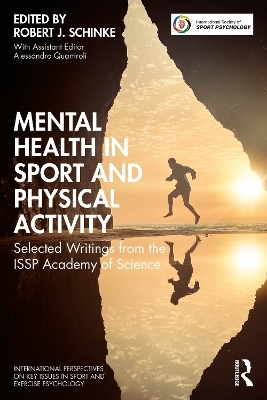
Mental Health in Sport and Physical Activity
Routledge (Verlag)
978-1-032-60396-4 (ISBN)
Bringing together the most prestigious writings on mental health in sport and physical activity from the International Society of Sport Psychology’s flagship journal, International Journal of Sport and Exercise Psychology, this volume provides an essential reference for the field of sport and exercise psychology.
Carefully selected for their popularity and impact on the field, the chapters in this volume feature an international range of contributions. Each chapter has been closely updated to ensure its relevance in current research and maintain its position as a piece of state-of-the-art scholarship. Chapters cover a range of topics, including the mental health of high-performance athletes, assessment methods and screening tools, adjustment patterns in the junior to senior transition, the role of perfectionism, body shaming, mindfulness, and exercise addiction. The book concludes with a discussion of key takeaways from the preceding chapters and suggestions for future opportunities. Endorsed by the Society’s Academy of Science, this volume is an authoritative series of writings on mental health in sport and physical activity.
Brought together in a single volume for the first time, the book is a must-have for graduate students, scholars, and professions in sport and exercise psychology.
Robert J. Schinke is President for the International Society of Sport Psychology (ISSP) and a Past President of the Association for Applied Sport Psychology (AASP). Robert is a Full Professor and the Canada Research Chair of Multicultural Sport and Physical Activity at Laurentian University, in Canada, and a Distinguished Honorary Professor at Tsing Hua University, in Taiwan. Robert has worked extensively with world champion professional boxers featured on major television networks, consults also with an assortment of professional sport athletes across disciplines, and has served as Mental Training Consultant with several Canadian male and female national teams each Olympic cycle since 1996. Alessandro Quartiroli is a current member of the International Society of Sport Psychology (ISSP) and previously a member of the Executive Board of the Association for Applied Sport Psychology (AASP, USA). Ale is a Professor of Psychology at the University of Wisconsin-La Crosse (US) and a Visiting Reader at the University of Portsmouth (UK). A transnational scientist-practitioner, Ale provides applied services to a variety of clients from different performing domains, levels of competition, and geographical locations. He supervises trainees' applied and scholarly practice in the US, UK, and other countries. Ale’s scholarly work is centered around the training, development, and practice of sport, exercise, and performance psychology scientist-practitioners.
1. Introduction: The International Society of Sport Psychology Academy of Science
Robert J. Schinke, Alessandro Quartiroli, YoungHo Kim, Kazutoshi Kudo, Yu-Kai Chang, and Nikos Comoutos
2. Updated Consensus Statement on Improving the Mental Health of High-Performance Athletes
Kristoffer Henriksen, Robert J. Schinke, Karin Moesch, Sean McCann, William D. Parham, Carsten Hvid Larsen, and Peter C. Terry
3. International Society of Sport Psychology Position Stand: Mental Health Through Occupational Health and Safety in High performance Sport
Robert J. Schinke, Cole Giffin, Suzanne Cosh, Kitrina Douglas, Daniel Rhind, Chris Harwood, Gangyan Si, and Athanasios Papaiounnou
4. The Mental Health of Chinese Elite Athletes: Revisiting the Assessment Methods and Introducing a Management Framework
Gangyan Si, Xin Li, Zhijian Huang, Dandan Wang, Yuan Wang, Jing-Dong Liu, Hao Liu, Daliang Zhao, Danran Bu, and Chun-Qing Zhang
5. Preliminary Psychometric Validation of a Brief Screening Tool for Athlete Mental Health Among Male Elite Athletes: The Athlete Psychological Strain Questionnaire
Simon M. Rice, Alexandra G. Parker, Daveena Mawren, Patrick Clifton, Peter Harcourt, Michael Lloyd, Alex Kountouris, Ben Smith, Patrick D. McGorry, and Rosemary Purcell
6. Elite Athletes’ Achievement Goals, Burnout Levels, Psychosomatic Stress Symptoms, And Coping Strategies
Martin Daumiller, Raven Rinas, and Jennifer Breithecker
7. Swedish Athletes’ Adjustment Patterns in the Junior-to-senior Transition: Viewing the Study from Today’s Perspective
Alina Franck, Natalia B. Stambulova, and Andreas Ivarsson
8. Cumulative Lifetime Stressor Exposure and Health in Elite Athletes: The Moderating Role of Perfectionism
Ella McLoughlin, David Fletcher, Hannah, L. Graham, Rachel Arnold, Daniel, J. Madigan, George M. Slavich, and Lee J. Moore
9. Body Shaming as a Form of Emotional Abuse in Sport
Erin Willson and Gretchen Kerr
10. Lifestyle Challenges and Mental Health of Professional Tennis Players: An Exploratory Case Study
Saul Shrom, Jennifer Cumming, and Sarah-Jane Fenton
11. The Association and Mechanisms Between Mindfulness and Mental Health Outcomes in Athletes: Testing Self-Determination Theory
Stephen Shannon, Donncha Hanna, Gerry Leavey, Tandy Haughey, Drew Neill, and Gavin Breslin
12. Reflections on the Empirical Examination Comparing the Mindfulness-Acceptance-Commitment Approach and Psychological Skills Training for the Mental Health and Sport Performance of Female Student Athletes
Zella E. Moore, Frank L. Gardner, Mike Gross, Andrew T. Wolanin, Rachel Pess-Gross, and Donald R. Marks
13. Passion and Exercise Addiction: Healthier Profiles in Team than in Individual Sports: An Update
Attila Szabo, István Soós, Ricardo de la Vega, Roberto Ruíz-Barquín, and Rita Kovacsik
14. Long-Term Qigong Practice is Associated with Improved Self-perceived Health and Quality of Life
Takashi Shimazaki, Tibor Hortobágyi, Azusa Uematsu, Hirofumi Kobayashi, Madoka Nakamura, Masataka Kiryu, and Shuji Suzuki
15. Exercise May Benefit Patients with Schizophrenia
Chen Chang, Chiung-Ling Chu, and Tsung-Min Hung
16. Concluding Reflections and Future Pathways
Robert J. Schinke and Alessandro Quartiroli
| Erscheinungsdatum | 11.04.2024 |
|---|---|
| Reihe/Serie | ISSP Key Issues in Sport and Exercise Psychology |
| Zusatzinfo | 28 Tables, black and white; 12 Line drawings, black and white; 12 Illustrations, black and white |
| Verlagsort | London |
| Sprache | englisch |
| Maße | 156 x 234 mm |
| Gewicht | 160 g |
| Themenwelt | Sachbuch/Ratgeber ► Sport |
| Geisteswissenschaften ► Psychologie ► Allgemeine Psychologie | |
| Medizin / Pharmazie ► Medizinische Fachgebiete ► Psychiatrie / Psychotherapie | |
| Weitere Fachgebiete ► Sportwissenschaft | |
| ISBN-10 | 1-032-60396-8 / 1032603968 |
| ISBN-13 | 978-1-032-60396-4 / 9781032603964 |
| Zustand | Neuware |
| Informationen gemäß Produktsicherheitsverordnung (GPSR) | |
| Haben Sie eine Frage zum Produkt? |
aus dem Bereich


